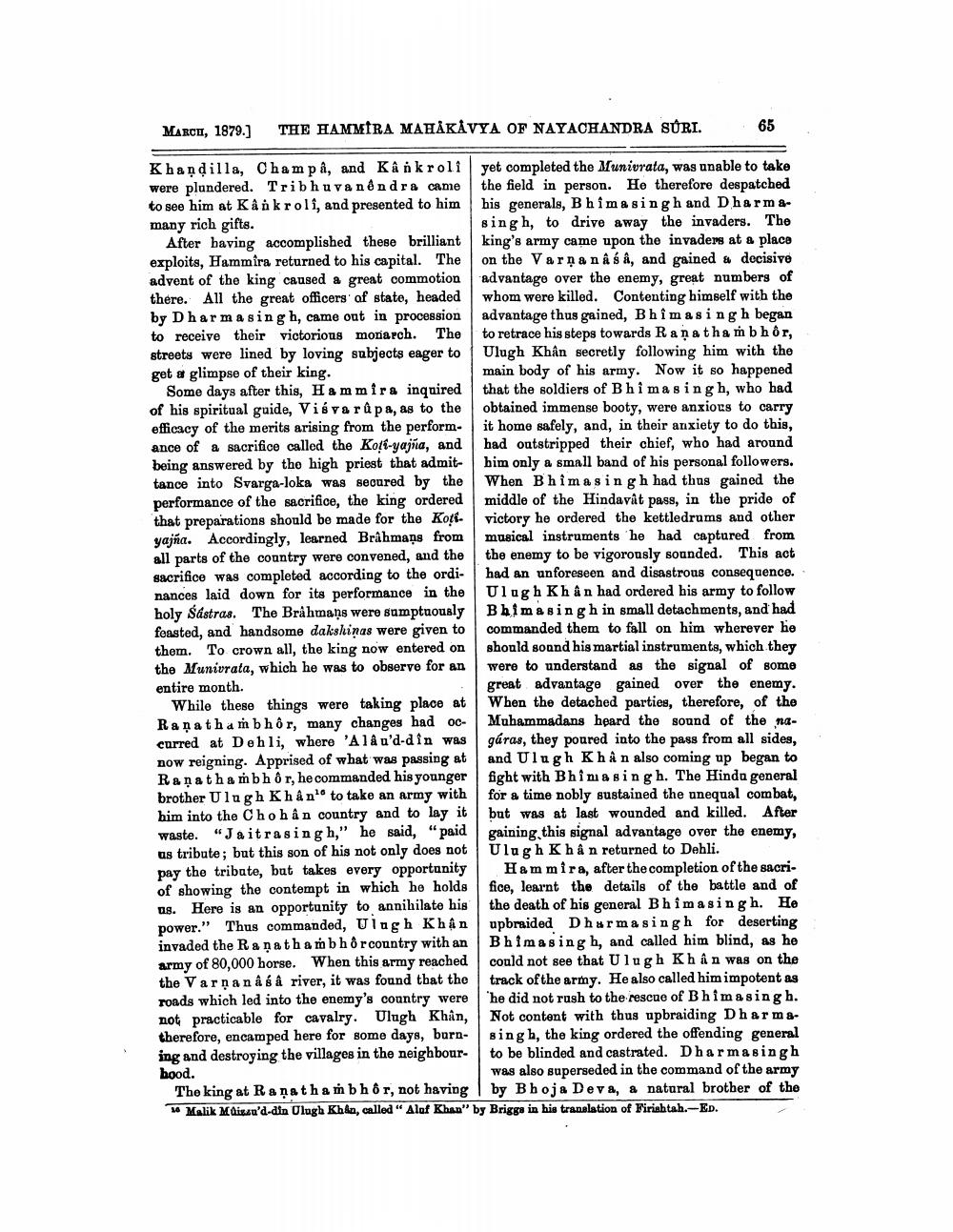________________
MARCII, 1879.] THE HAMMIRA MAHAKAVYA OF NAYACHANDRA SURI.
Khanḍilla, Champå, and Kankroli were plundered. Tribhuvanêndra came to see him at Kankroli, and presented to him many rich gifts.
After having accomplished these brilliant exploits, Hammira returned to his capital. The advent of the king caused a great commotion there. All the great officers of state, headed by Dharmasin g h, came out in procession to receive their victorious monarch. The streets were lined by loving subjects eager to get a glimpse of their king.
Some days after this, Hammira inquired of his spiritual guide, Visvara pa, as to the efficacy of the merits arising from the performance of a sacrifice called the Koti-yajña, and being answered by the high priest that admit tance into Svarga-loka was secured by the performance of the sacrifice, the king ordered that preparations should be made for the Kotiyajña. Accordingly, learned Brahmans from all parts of the country were convened, and the sacrifice was completed according to the ordinances laid down for its performance in the holy Sástras. The Brahmans were sumptuously feasted, and handsome dakshinas were given to them. To crown all, the king now entered on the Munivrata, which he was to observe for an entire month.
While these things were taking place at Ranathambhôr, many changes had occurred at Dehli, where 'Alâu'd-din was now reigning. Apprised of what was passing at Ranathambhô r, he commanded his younger brother Ulugh Khân to take an army with him into the Cho hân country and to lay it waste. "Jaitrasingh," he said, "paid us tribute; but this son of his not only does not pay the tribute, but takes every opportunity of showing the contempt in which he holds us. Here is an opportunity to annihilate his power." Thus commanded, Uingh Khan invaded the R a nathambhor country with an army of 80,000 horse. When this army reached the Varnan âé à river, it was found that the roads which led into the enemy's country were not practicable for cavalry. Ulugh Khân, therefore, encamped here for some days, burning and destroying the villages in the neighbourhood.
65
yet completed the Munivrata, was unable to take the field in person. He therefore despatched his generals, Bhimasingh and Dharmasingh, to drive away the invaders. The king's army came upon the invaders at a place on the Varnanâsâ, and gained a decisive advantage over the enemy, great numbers of whom were killed. Contenting himself with the advantage thus gained, Bhimasingh began to retrace his steps towards R ana thambhor, Ulugh Khân secretly following him with the main body of his army. Now it so happened that the soldiers of Bhi ma singh, who had obtained immense booty, were anxious to carry it home safely, and, in their anxiety to do this, had outstripped their chief, who had around him only a small band of his personal followers. When Bhimasingh had thus gained the middle of the Hindavât pass, in the pride of victory he ordered the kettledrums and other musical instruments he had captured from the enemy to be vigorously sounded. This act had an unforeseen and disastrous consequence. Ulugh Khân had ordered his army to follow Bhimasingh in small detachments, and had commanded them to fall on him wherever he should sound his martial instruments, which they were to understand as the signal of some great advantage gained over the enemy. When the detached parties, therefore, of the Muhammadans heard the sound of the nagáras, they poured into the pass from all sides, and Ulugh Khân also coming up began to fight with Bhinasingh. The Hindu general for a time nobly sustained the unequal combat, but was at last wounded and killed. After gaining this signal advantage over the enemy, Ulugh Khân returned to Dehli.
Hammira, after the completion of the sacrifice, learnt the details of the battle and of the death of his general Bhima singh. He upbraided Dharmasingh for deserting Bhimasingh, and called him blind, as he could not see that Ulugh Khan was on the track of the army. He also called him impotent as he did not rush to the rescue of Bhima singh. Not content with thus upbraiding Dharmasingh, the king ordered the offending general to be blinded and castrated. Dharmasingh was also superseded in the command of the army by Bhoja Deva, a natural brother of the
The king at Ra nathambhôr, not having
Malik Muizzu'd-din Ulugh Khân, called " Alaf Khan" by Briggs in his translation of Firishtah.-ED.




